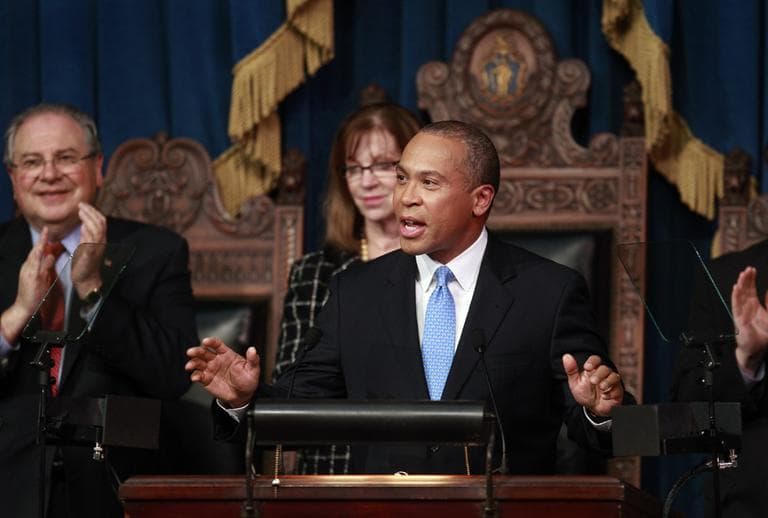Advertisement
Patrick Outlines Initiatives In State Of The State Address
Resume
There are mixed reviews for Gov. Deval Patrick's State of the Commonwealth address Monday night at the State House. Democratic leaders say they're already working on many of the initiatives the governor is calling for, while Republicans faulted him for not focusing enough on the state's business climate.
Patrick said things are better in Massachusetts than in most other places, but added that doesn't mean they're good enough.
"There are workers, some unemployed for many months, who wonder tonight whether this new economy has a place for them. There are small businesses and working families who now have the security of health insurance, but wonder tonight whether they can manage the ever-increasing costs. There are children tonight, who wonder whether they will be safe when they step outside their own front door," Patrick said.
To meet those challenges, the governor highlighted three initiatives he called on the Legislature to pass.
Patrick said things are better in Massachusetts than in most other places, but added that doesn't mean they're good enough.
On the jobs front, he wants the state's 15 community colleges to work with area businesses to offer skills training to residents, in the hopes of filling the 120,000 job openings now available in Massachusetts.
"Many of these openings are for so-called middle-skills jobs, that require more than a high school diploma, but not necessarily a four-year degree," Patrick said. "Jobs in medical device manufacturing, or as lab technicians, or solar installers, for example."
The governor identified what he called a "skills gap," where people are forced by the economy to change careers, but don't have the proper training for those new jobs.
"Consider what it would mean if those 120,000 open positions were filled. It would mean the commonwealth's unemployment rate would be cut in half, to its lowest in a decade," he said.
While pointing out community colleges are uniquely positioned to close that skills gap, Patrick said the 15 schools must be brought together in a unified system. Currently, all the state's community colleges have their own line item in the state budget. The governor's plan would streamline the funding into one line item, with the Board of Higher Education allocating the money. The governor also wants to increase funding to community colleges by $10 million.
"We can do more to control health care costs as well," he said.
To address the rising cost of health care, the governor once again called on the Legislature to pass a bill he filed last year aimed at cost containment.
"We need to put an end to the 'fee-for-service' model. We need to stop paying for the amount of care, and start paying for the quality of care," Patrick said.
While the governor wants the Legislature to take up health care cost containment before they debate the state budget, both Senate President Therese Murray and Speaker Robert DeLeo indicated it may take more time.
"It's a very difficult piece of legislation 'cause we don't want to harm our health care institutions, they're the No. 1 driver of our economy," Murray said.
"Obviously, health care payment reform, which I have learned, you know, is a very, very complicated subject matter," added DeLeo. "You know, you have folks with different interests, not only the large hospitals, the small hospitals, facilities from throughout the state. And I think you have to be somewhat careful."
And finally, Patrick urged lawmakers to pass a comprehensive crime bill, including a mandatory life sentence without parole for anyone who's third conviction is for murder.
"These reforms are not about sweeping up the innocent or the unlucky. They rightly focus on the worst of those who repeatedly prey on our residents," Patrick said.
The governor is also calling for non-violent drug offenders to be eligible for parole sooner, saying that simply warehousing them is a costly public failure.
"By permitting them to have supervised release after serving half their sentence, we can begin to re-integrate 400 to 500 non-violent offenders in the next year, and save millions in prison costs every year," he said.
But that does not sit well with some prosecutors, including Plymouth County District Attorney Tim Cruz.
"Virtually all the drug crimes, especially when you're dealing with drug dealers pedaling poison, all are violent, or soon to be violent individuals," Cruz said.
Lawmakers don't have a lot of time to act on all of the governor's initiatives: legislative rules say they must finish up work on major bills by July 31.
More:
This program aired on January 24, 2012.
